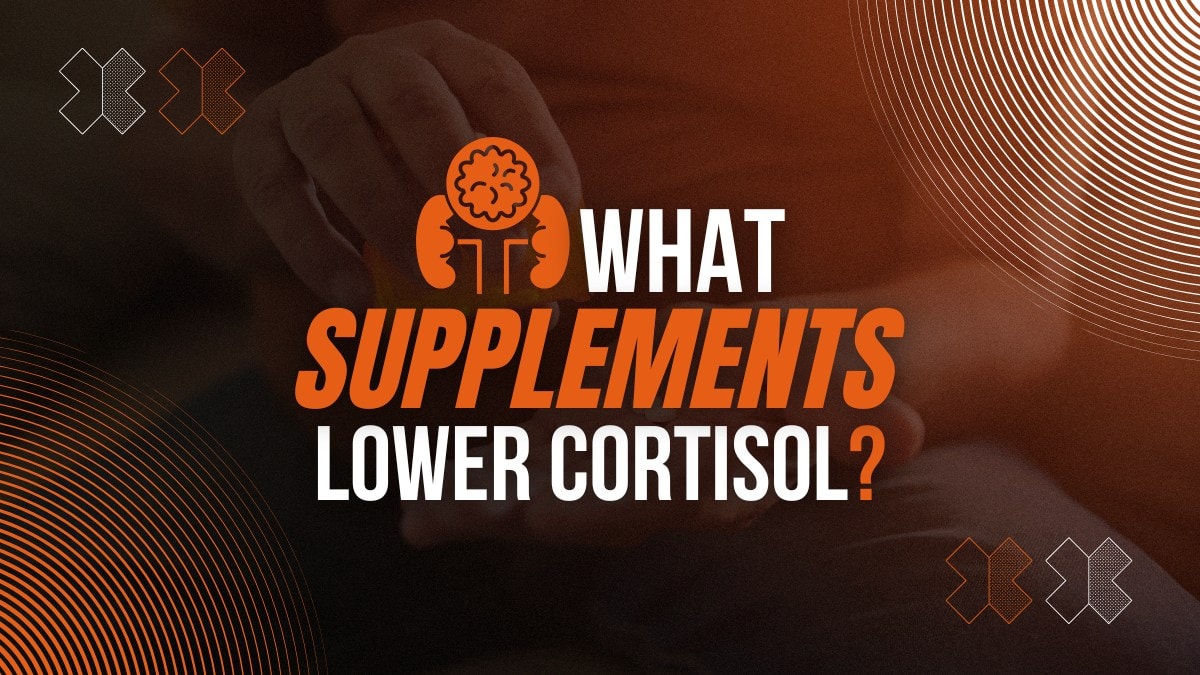
Do you sometimes feel totally wired but also tired? Like your body’s stuck in high gear?
You might be battling high cortisol, your body’s main stress hormone. While stress is a part of life, chronically elevated cortisol can wreak havoc on your life. It can disrupt your sleep patterns and may even cause you to gain weight (the dreaded one)!
But before you reach for a prescription, you might be wondering, “Are there supplements to lower cortisol?” And if so, what are they? What supplements lower cortisol and help your body find its calm?
This guide will break down what cortisol is and how it impacts your well-being. After that, we will look into the research behind supplements that may gently nudge those stress levels back into a healthy zone.
Understanding Cortisol
Cortisol is a steroid hormone produced by the adrenal glands. It helps regulate your blood sugar levels, manages inflammation, controls your sleep-wake cycle, and even influences your memory.
When you encounter a stressful situation, be it a looming deadline at work, having a difficult conversation, or even just getting startled, your brain signals the adrenals to release a surge of cortisol. This surge provides you with a quick burst of energy by releasing glucose into your bloodstream.
In turn, that mechanism prepares you to either face the threat or run away from it, the classic fight-or-flight response.
So, at its core, cortisol is essential for survival and helps your body adapt to the daily ups and downs of life. Some people like to call it the body’s natural stress alarm.
High Cortisol Symptoms
Recognizing these symptoms is the first step towards addressing high cortisol levels:
- Weight gain, especially around the abdomen
- Difficulty falling asleep, staying asleep, or waking up feeling unrefreshed
- Feeling anxious, depressed, or easily agitated
- Persistent fatigue
- Frequent colds or infections
- Tension headaches (pain that feels like a tight band around the head)
- Acne, eczema, or other skin issues
Common Causes of Elevated Cortisol
Managing chronically high cortisol levels often involves a cortisol detox, and the key to this process is knowing what triggers your body’s stress response in the first place. Some common culprits include:
- Inconsistent sleep schedules or insufficient sleep
- High intake of processed foods, sugar, and caffeine
- Lack of exercise (or excessive exercise)
- Dealing with long-term health issues
- Psychiatric and high blood pressure medications
- Significant life events like moving, changing jobs, or experiencing loss
How Supplements Can Help
While not a substitute for addressing the root causes of chronic stress, understanding what supplements help regulate cortisol can be a helpful piece of the puzzle. Adaptogens like ashwagandha, rhodiola rosea, and holy basil are often cited for their potential to help the body adapt to stress and modulate cortisol release.
Magnesium and B vitamins play roles in nervous system regulation and may indirectly influence cortisol. Additionally, some research suggests that phosphatidylserine could help lower cortisol levels in response to stress.
Best Supplements to Lower Cortisol
While lifestyle changes are key, certain supplements can be powerful allies in gently nudging your stress levels back into balance. So, what supplements lower cortisol, and what does science say about them? Here are the best contenders:
Ashwagandha
An eight-week study revealed that taking ashwagandha, at both a lower dose of 250 mg daily and a higher dose of 600 mg daily, significantly lowered levels of the stress hormone cortisol [1].
Rhodiola Rosea
The results of a four-week study indicated that a 200 mg dose of rhodiola rosea led to a noticeable improvement in the reported stress symptoms of the participants [2].
Phosphatidylserine
A study revealed that 800 mg of phosphatidylserine significantly reduced the release of ACTH and cortisol (two key stress hormones) in response to exercise [3].
Omega-3 Fatty Acids (Fish Oil)
Omega-3 supplements, taken daily for four months by 138 inactive, overweight, middle-aged individuals, appeared to boost their ability to handle stress. Afterward, during recovery, their bodies exhibited a greater capacity to bounce back from stress [4].
Magnesium
Magnesium plays a vital role in calming the body’s stress response by influencing how our nervous system reacts. Studies have noted lower magnesium levels in individuals experiencing stress or anxiety-related issues [5].
Meanwhile, a review of 18 studies hints that magnesium might ease subjective anxiety in those prone to it. But the evidence isn’t strong enough yet [6].
L-Theanine
In a study involving 34 healthy adults aged 18 to 40, researchers found that drinking an L-theanine beverage significantly lessened their self-reported stress levels one hour after facing a multitasking challenge, compared to when they drank a placebo [7].
Holy Basil (Tulsi)
Tulsi, also known as holy basil, is a powerful stress-fighting herb that works on multiple levels. Science suggests it can help ease mental stress, potentially improving your memory and focus while also having calming, anti-anxiety, and even mood-lifting effects [8].
Licorice Root
Research on a PTSD model showed that treatment with glycyrrhizin, a compound found in licorice, noticeably lessened anxiety and the recall of fearful memories [9].
B-Complex Vitamins
A study found a potential link between consuming more B vitamins, particularly biotin, and having fewer symptoms of depression, anxiety, and stress [10].
Probiotics
A review of seven studies suggests that taking probiotics might help reduce how stressed healthy individuals feel and could ease mild anxiety or low mood linked to stress [11].
How to Choose the Right Cortisol Supplement
Even though you now know what supplements lower cortisol, choosing the right one is still a big decision. Here’s how to navigate the options and land on the best one for you.
Importance of Consulting a Healthcare Professional
It might be tempting to just grab something off the shelf, especially if you’re already feeling stressed out. But the absolute first step is chatting with your doctor and discussing what supplements lower cortisol levels based on your individual needs.
Look for Third-Party Testing
When you’re browsing what supplements reduce cortisol levels, keep an eye out for products that are third-party tested. This means an independent lab has checked what’s actually in them.
Opt for Supplements With High Bioavailability
Second, consider bioavailability – that’s how well your body can absorb and use the supplement. Certain forms of ingredients are easier for your body to take in, so doing a little research on the specific ingredients can be really beneficial.
Tips for Stacking
You might see some supplements that combine multiple cortisol-managing ingredients, and you might be thinking, “Hey, more must be better, right?” Not necessarily! While certain combinations can work well together, it’s really easy to overdo it or take things that might interact in unexpected ways.
Lifestyle Tips to Support Lower Cortisol
Adopting the following lifestyle habits can significantly help you learn how to reduce stress and promote a calmer, healthier state.
Sleep Hygiene
Good sleep habits are key to a healthy cortisol rhythm. Aim for a consistent sleep schedule, even on weekends. Create a relaxing bedtime routine – maybe a warm bath, reading a book, or dimming the lights. Your bedroom environment matters too: make it dark, quiet, cool, and comfortable.
Exercise in Moderation
Moving your body is fantastic for stress, no doubt. But when it comes to cortisol, you need to find that sweet spot. Regular, moderate exercise, like a brisk walk around your neighborhood, a jog in the park, or even dancing to your favorite tunes, can help lower cortisol over time.
Meditation and Practicing Mindfulness
Even just five to ten minutes a day of focused breathing, a guided meditation app, or simply paying attention to your senses will do. Any of these activities can help dial down that stress response and, in turn, lower cortisol.
Balanced Diet
Prioritize plenty of fruits, vegetables, whole grains, and lean protein as they provide your body with the nutrients it needs to cope with stress. Avoid sugary drinks and processed foods, which can mess with your blood sugar and indirectly impact cortisol.
Expert Insights on How to Lower Cortisol
MedlinePlus highlights ashwagandha’s potential effectiveness for anxiety, stress, and insomnia, noting typical adult doses of up to 1000 mg daily for 12 weeks [12].
Separately, one study indicates that individuals taking both magnesium supplements and vitamin B6 concurrently reported lower stress levels compared to those not supplementing [13].
FAQs on What Supplements Lower Cortisol
Here are some frequently asked questions on what supplements help lower cortisol, broken down to give you a clear picture.
What Is the Best Supplement to Reduce Cortisol?
“Best” is subjective and depends on the individual, but ashwagandha and phosphatidylserine have shown promising results if you’re exploring options for what supplements lower cortisol [1] [3].
How Can I Lower My Cortisol Level Quickly?
While long-term strategies are most effective, you can try a few things for a temporary cortisol dip: engage in deep breathing exercises for a few minutes, listen to calming music, or step away from the stressful situation if possible.
What Is the Best Vitamin for Low Cortisol?
B vitamins (especially B5 and B6) and vitamin C are top options if wondering what vitamins help lower cortisol. Ensuring adequate intake through diet or supplementation (if recommended by a doctor) might be supportive.
Is Ashwagandha a Cortisol Blocker?
While “cortisol blocker” isn’t the precise scientific term, ashwagandha acts as an adaptogen that helps regulate the body’s stress response system. It doesn’t block cortisol entirely, but it helps to keep it within a healthier range.
What Vitamin Deficiency Is High Cortisol?
High cortisol isn’t directly caused by a single vitamin deficiency. However, research into which vitamins lower cortisol suggests a connection between adequate levels of vitamin D and certain B vitamins and a healthy stress response.
Can Magnesium Lower Cortisol?
Yes, magnesium may help lower cortisol levels. This essential mineral plays a role in regulating the nervous system and the body’s stress response, and adequate magnesium intake has been linked to reduced cortisol in some studies.
What Supplements Lower Cortisol? Conclusion
So, there you have it – a comprehensive look at the supplements that may help you dial down that stress hormone, cortisol.
From ashwagandha pills to magnesium and l-theanine, there are various natural allies you can explore if wondering what supplements lower cortisol.
But remember, a truly effective stress management strategy should integrate a balanced diet, regular exercise, and prioritizing sleep and mindfulness.
 11 Niche Experts
11 Niche Experts
 100+ Product Reviews
100+ Product Reviews
 50+ Tested Products
50+ Tested Products
At BestDaily, our mission is simple: to help you make confident, informed decisions about the products that impact your daily life. Whether you're searching for wellness essentials or lifestyle upgrades, we combine hands-on testing with expert analysis to highlight what truly works.

